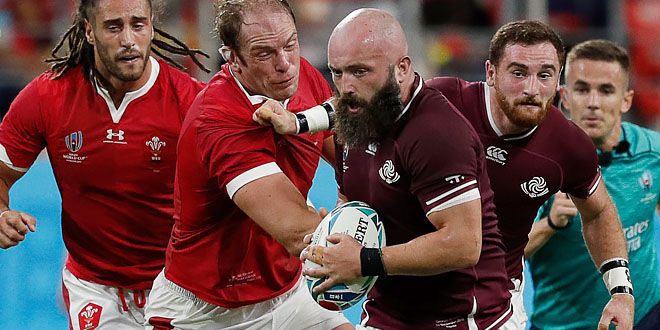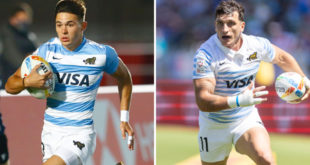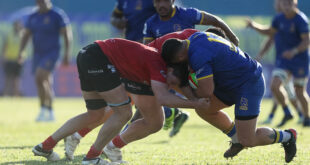World Cups bring together leading teams for a special tournament. The best against the best is determined by earning the right to compete by eliminating others in qualifying matches. In rugby it is not exactly so. When will rugby get its act together to have genuine World Cup Qualifiers?
World Cup Qualifiers Structure
20 teams compete at Rugby World Cups. 12 qualify automatically based on finishing in the top three of their pool. As such, 60% of the slots are determined four years before the tournament with four of them going to teams that were eliminated in the group stage.
The FIFA World Cup requires all teams except the host to qualify. They do so by competing in regional tournaments that are organized by the confederations – AFC (Asia), CAF (Africa), CONCAF (North America), CONMEBOL (South America), OFC (Oceania), and UEFA (Europe).
The regions are allocated differing slots for the World Cup. For the 2022 FIFA World Cup UEFA has the most with 13 while OFC has none. The OFC champion advances to face the 4th placed team from CONCAF in a play-off to determine who qualifies for the World Cup.
Eight places at the Rugby World Cup are determined by qualifying tournaments. Six slots are decided via regional tournaments, one by a cross-regional play-off and one via a final qualification tournament. For 2023 the six regional slots are Rugby Europe (2), Rugby Afrique (1), Americas (2), and Oceania Rugby (1). Asia Rugby’s champion faces Oceania 2 with the winner qualifying. The play-off tournament involves the next best from Africa, Americas, Europe and the loser of Asia 1 vs Oceania 2.
Qualifying Entrants
Fewer teams are involved in the RWC 2023 qualifiers than the RWC 2019 qualifiers. Travel restrictions saw the number falling from 20 in the Americas for 2019 to 7 for 2023. Asia decreased from 10 for 2019 to 3 for 2023 and in Europe it was 31 for RWC 2019 but 6 for RWC 2023.
There were 79 overall entrants in the 2019 qualifiers compared to 34 for the RWC 2023 qualifiers. 14 teams competed for Africa 1 in both the 2019 and 2023 qualifiers.
The FIFA World Cup qualifiers involve 54 CAF entrants for the 2022 tournament. There are 55 UEFA entrants in addition to 34 from CONCAF, 1o from CONMEBOL, 9 from the OFC and 45 from the AFC. The overall number of qualifying competitors for 2022 are three less than for 2018.
Qualifying Timeframe and Tournament Draw
Rugby World Cup qualifying matches begin and conclude at different times. Samoa and Uruguay qualified for RWC 2023 as Oceania 1 and Americas 1 in 2021. Europe 1 and Europe 2 will be determined in March 2022, Americas 2 and Africa 1 in July 2022 and the final qualification tournament will be held in November 2022.
FIFA World Cup qualifiers also vary across regions. For 2022 the AFC is the longest. It runs from June 2019 to June 2022. UEFA is the shortest from March 2021 to March 2022. Germany was the first to join hosts Qatar in the tournament. Germany qualified on October 11, 2021. This happened after Samoa and Uruguay had qualified for the Rugby World Cup, a tournament to be played the year after Qatar 2022.
The draw for the 2022 FIFA World Cup takes place in April 2022. The Rugby World Cup 2023 draw was held in December 2020. The early scheduling of the Rugby World Cup draw affected the qualifying process. For instance, there was not time for Mexico and Caribbean countries to compete and Colombia’s cancelled match against Chile was not rescheduled.
Annual Rugby Competition
In non-World Cup years there are player release rugby windows in July and November for friendly international competition. They are structured so that European teams tour in July and host matches in November. They involve, in some form, all World Cup teams and a range of others involved in qualifiers.
The Six Nations Championship is played annually in February and March and the Rugby Championship from August to October. These exclusive competitions have expanded once each since rugby went professional in 1995. They combine to involve 50% of the Rugby World Cup competitors.
The structure of annual competitions means differing opportunities. The Six Nations is not an inclusive European Championship, nor is the Rugby Championship an inclusive Southern Hemisphere championship. Fiji, Georgia and Japan are examples of excluded teams.
When will rugby get its act together to have genuine World Cup Qualifiers? When will there be a model that requires the majority to qualify? When will Fiji be able to host Australia in a World Cup qualifier or Georgia do so against Wales? Both these fixtures were matches at RWC 2019; yet, there is no Oceania Cup nor a European Championship.
Regional Rugby World Cup Qualifiers
The Americas Rugby Championship operated from 2016-2019 with Brazil, Canada, Chile, Uruguay, the USA and the Argentina XV. A model could see earlier rounds involving more teams from the region. The finals could involve Argentina and five qualifiers. Under a 20-team World Cup model, three could qualify and the 4th placed team could enter repechage.
An Oceania Cup could involve Australia, Fiji, Japan, New Zealand, Samoa and Tonga. A champion could be crowned and five could qualify for the World Cup and be seeded as Oceania 1 to Oceania 5. The bottom side would be able to continue by competing in repechage. That team could compete in a tournament with top performers from an Asian Cup in subsequent elimination matches.
The gulf between the Springboks and others in Africa could see the African Cup champion facing South Africa in a final to determine who is Africa 1 and who is Africa 2. It would also be an opportunity for the example of Namibia hosting South Africa in Windhoek.
A European Cup could bring together the top 10 to compete in two pools. Among the possibilities are four slots for teams to join the Six Nations in a qualifying tournament. It could determine seedings with Europe 1 to Europe 8 and it could involve a final to crown a European champion.
 Americas Rugby News Rugby news from across the Americas!
Americas Rugby News Rugby news from across the Americas!




